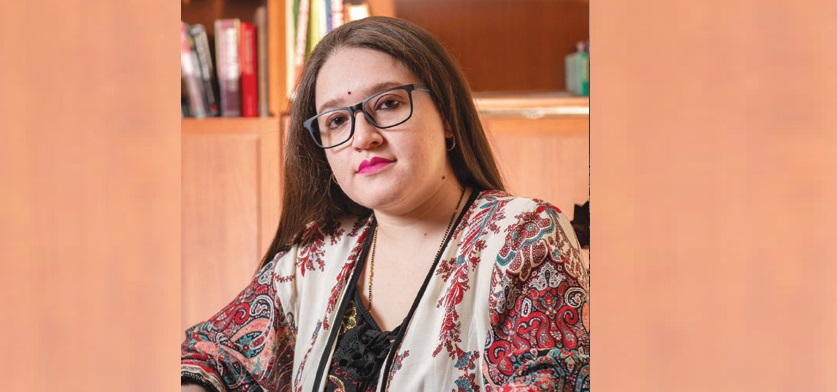Welcoming all God’s children: dispelling misconceptions about Autism
The Church is a home for all of God’s children. Yet, for many autistic individuals and their families, attending Mass or participating in community events can be a challenge — often not due to a lack of faith, but because of misunderstandings that create unintentional barriers to inclusion.
Apr 25, 2025

Inclusion Matters - Desiree Kaur
“Accept one another, then, just as Christ accepted you, in order to bring praise to God” (Romans 15:7).
The Church is a home for all of God’s children. Yet, for many autistic individuals and their families, attending Mass or participating in community events can be a challenge — often not due to a lack of faith, but because of misunderstandings that create unintentional barriers to inclusion.
As a Church, we are called to be the Body of Christ — diverse, united, and whole. Acceptance does not mean asking autistic individuals to mask who they are. Instead, it means embracing their presence, making space for different expressions of faith, and honouring the unique ways they experience the divine.
Since 2007, 2 April has been celebrated as World Autism Awareness Day, sanctioned by the United Nations. Over the years, this has evolved into month-long events aimed at raising awareness, leading to greater acceptance, advocacy, and action towards a more inclusive world for all. While awareness has grown, it remains essential to continue educating our communities about our neurodivergent friends. As this month holds great significance for the autism community, this article will highlight some common misconceptions about autism.
Autism is neither a label nor a behavioural issue. It is a neurological condition that affects an individual’s ability to engage in social communication and interaction. Autistic individuals may also display repetitive actions such as handflapping, spinning, or repeating lines from films or shows. Parents of autistic children often face the assumption that they are merely labelling their child, but this is far from the truth. Diagnosis serves the purpose of ensuring that the child receives the appropriate support they need.
One common misconception is that challenging behaviours stem from disobedience or poor parenting, when in fact, these behaviours often arise from sensory overload, anxiety, or difficulties with transitions. Sensory processing refers to how the brain interprets input from the senses — sight, sound, touch, taste, smell, and movement. Autistic individuals may be over- or under-stimulated. It’s important to understand that some are averse to certain sensory stimuli, while others are sensory seekers who crave such input.
Another common misconception is that autistic people do not desire connection with others. In truth, many do seek meaningful relationships, but may express themselves differently — through gestures, limited eye contact, or unique communication styles. Although the diagnostic criteria include challenges in social communication and interaction, this does not mean they lack the desire to connect. They do — but perhaps not in a way we traditionally recognise.
Autism does not “go away” over time. Early intervention and various therapies aim to equip autistic individuals with tools to cope and self-regulate. Autism is a lifelong condition; there is no cure.
Therefore, even as adolescents and adults, many continue to face challenges. Therapy is often long-term, evolving as the individual grows and their needs change. Like anyone else, an autistic person matures with unique and varying needs throughout different life stages.
The belief that all autistic individuals are savants is another harmful misconception. All autistics are different. As the saying goes: if you’ve met one person with autism, you’ve met one person with autism. Only a small percentage of autistic people are savants, and savantism is not exclusive to autism. This stereotype is perpetuated by the media and television shows that over represent savant characters. Whether or not an autistic individual has savant abilities, they still face a range of challenges.
Another misconception is that autistic individuals who can speak struggle less than those who are non-speaking. This is untrue. Their challenges are different, not less. Many are forced to mask their autistic traits — either consciously or unconsciously — in order to align with societal norms. This masking can be extremely draining and may negatively impact mental health over time. Many struggle with mental health issues because others fail to understand that their capacity to socialise is sometimes limited. Importantly, “limited” does not mean “non-existent.”
This April, let us take a meaningful step forward. How can you make a difference in your parish and beyond? Consider the distinction between integration and inclusion. While integration often involves allowing individuals who are different to join in — with the expectation that they will adapt to the “norm” — inclusion means making reasonable accommodations within systems and spaces to remove barriers and promote genuine participation.
Let us reconsider the notion that participation in Church must look a certain way. A child flapping their hands during the Gloria or an adult quietly humming during the homily is not being disruptive — they are worshipping in a way that feels safe and authentic to them.
Let us become a community where no one feels they must change who they are in order to belong. Just as Jesus welcomed the little children, the outcast, and the misunderstood, so too must we open our hearts and doors to our autistic brothers and sisters.
John 13:34–35 carries a profoundly heartfelt message:
“A new command I give you: Love one another. As I have loved you, so you must love one another. By this everyone will know that you are My disciples, if you love one another.”
(Desiree’s advocacy for all abilities began in 2017 after her son Haans was diagnosed with autism. Frustrated by the lack of accessible information, she took the initiative to educate herself, earning a Master’s in Special Education. A former PR practitioner, she went on to establish Project Haans, a website supporting Malaysia’s special needs community. She also co-hosts the Kita Family podcast with four other mothers of neurodivergent children.)







Total Comments:0